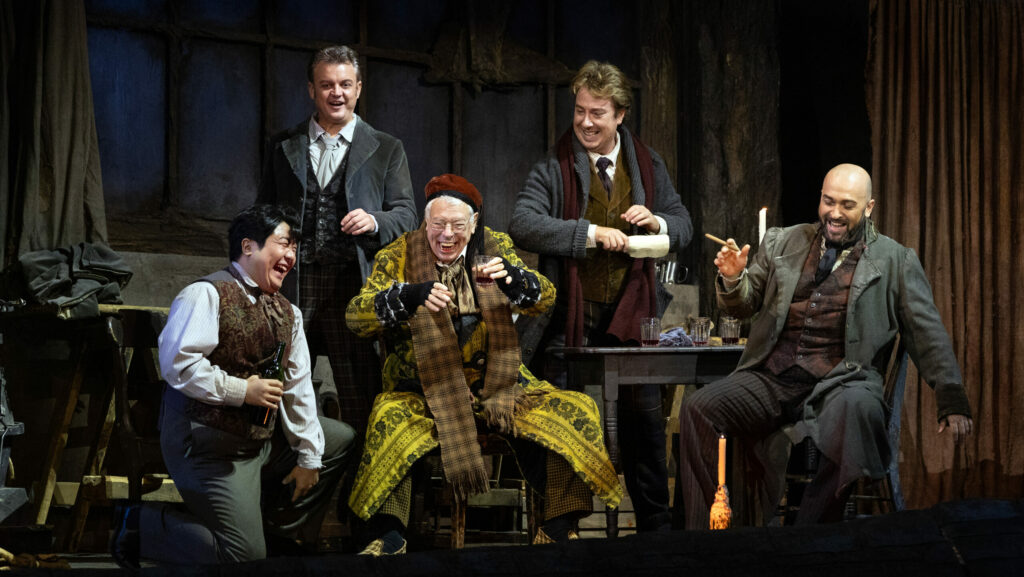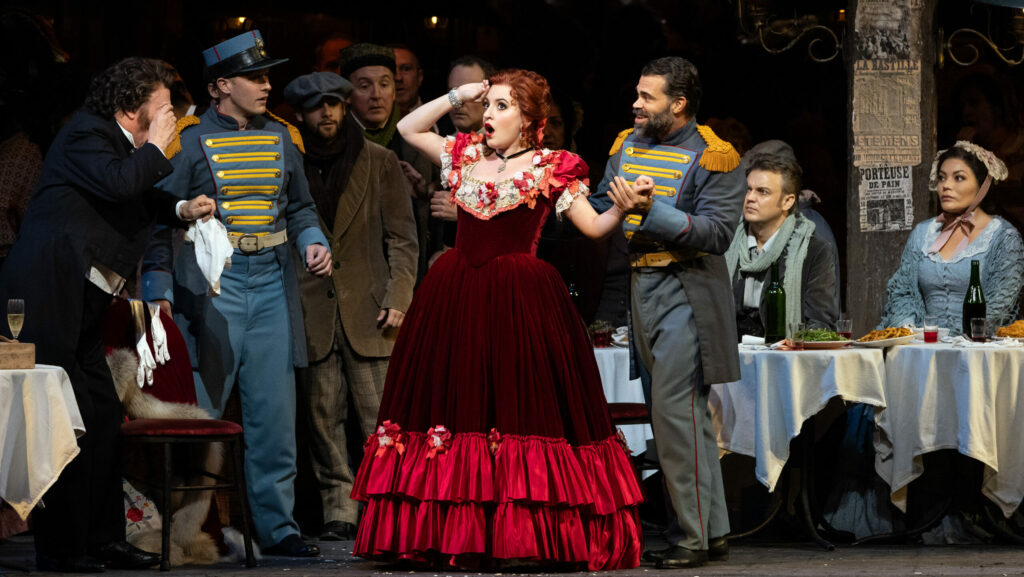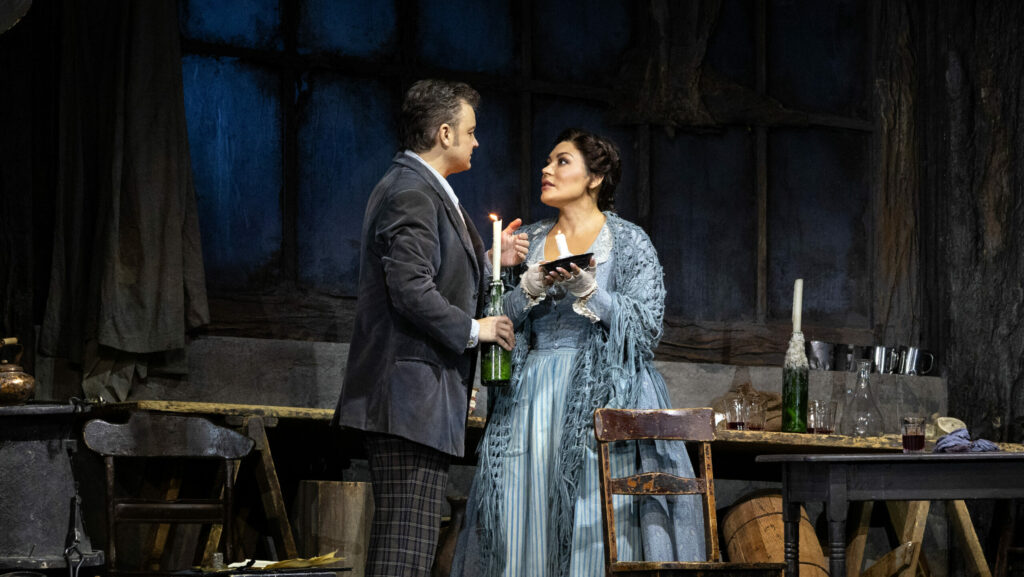Opening night of La bohème at the Met, the seats were packed with families with children, all set to watch Puccini’s most youth-oriented opera about how much fun you can have hanging with your homies. From the bros being bros hijinks in the first and last acts, to the lush Christmas parade in Act II, to the teen couples’ counseling sessions in Act III, I too was brought back to childhood, specifically my childhood in the 1980s. Was it just the Reagan-era Zeffirelli production, or was Puccini in fact the John Hughes or John Landis of his day, making perhaps the finest “dudes rock” masterpiece in existence? With the Ferris Bueler’s Day Off crowd scene, or the Animal House shenanigans of the bohemians in their garret, the teen bromance of it all feels so familiar. It’s all too easy to imagine John Belushi or Dan Ackroyd yucking it up in the Latin Quarter as Schaunard or Marcello.
Ailyn Pérez, as a quaveringly emotional Mimì, provided a raw vulnerability that centered her character amidst a chaotic and uneven opening night staging. She projected a halting frailty in her arias that worked well for her poor sickly character. While a fine performance, her Mimì also seemed like she was performing in a different production from the rest of the cast. Where the other singers performed as caricatures, Pérez performed social realism, presenting a crack in the make-believe and creating a distancing effect which didn’t enrich the performance as it may have been intended.
Dmytro Popov, as Rodolfo, heartbroken poet and Mimì’s paramour, was technically proficient and precise in his singing. His extraordinary voice was a salvation in a performance where his dynamic with the other characters, Mimì in particular, came off as icy. Especially given Mimì’s archly different vocal style from the rest of the cast, their scenes together lacked charisma and reciprocity. You never got the sense that they were singing to each other, just to an ideal audience off in the distance.
Emily Pogorelc, as the red headed bombshell Musetta, coursed with vitality, a perfect contrast to Mimì’s birdlike timidity. You couldn’t take your eyes off her, nor were you allowed to. She was here there and everywhere in Act II, a sexed-up Aunty Mame for the bohemian comrades of the Latin Quarter. Her bright, booming voice, part angel, part femme fatale, and part carnival barker, threw a lustrous coat of gilding across every scene she graced.
Throughout Mimì and Musetta’s iconic scenes, it seemed like I was watching an 80s recreation of female archetypes from Hollywood’s golden age. The production makes no attempt to tamp down Puccini’s chauvinism. The male leads ham it up together while the manic pixie dream seamstress and brazen good time gal are limited to performing for the audience alone. While Musetta the seductress wooed the bohemian bros and the audience simultaneously, Mimì was cut adrift from the rest of the cast. Granted, Mimì and Musetta aren’t really given many opportunities to relate to each other in the libretto either, but the dynamic could be created unscripted, through staging. Obviously, I was not expecting this woke alteration from the Zeffirelli production. I do not go looking for progressivism from lecherous Italian fascists. However, I was struck by how much better artistically the performance would have been had it leaned even a little bit into the complicity between the two female leads.
Conductor Kensho Watanabe drove the production along with youthful energy and technical exactitude. His conducting was balanced to a fault, taking us through moments both tender and uproarious with a steady hand. He didn’t create much in the way of special dynamics for the iconic moments. Choosing not to play to fan favorites is perfectly respectable, although I don’t know if it was appropriate for the material. If you’re trying to take the emotional intensity and gushing sentimentality out of La Bohème, what do you like about Romantic opera to begin with?
Other performances of note were baritone Gihoon Kim, in his Met debut role as Schaunard, the brains behind the bohemian bromance, and bass Bogdan Talos, in his Met debut as Colline, the philosopher who sings an aria to his overcoat. Kim ruffled up a sometimes stiff and schticky Act I, bestriding the stage with the brassiness of a Musetta. Puccini’s gang of bohemians need a thinker whose hijinks among the aristocracy keep them fed. Kim lapped up the role like he was born for it. Light on his feet in the dancing scene, with pristine comic timing and a warm, thunderous voice, Kim tore it up with the boho bros. Talos, meanwhile, glowered and postured to great effect, a towering, goofy Colline with a rich, tender bass voice doting upon his old coat like it was his lover.
As sleepy as this production is after 43 years at the Met, I’m glad they took it out of mothballs for another season. A warm bath of nostalgia can be good for you every so often. Although it lacks the psychedelic disco brilliance of Zeffirelli’s Turandot, it was interesting to see such an archly traditional staging, both for its glories and its abysmal failures. It was like watching a Christmas pantomime in London or one of those screenings of The Rocky Horror Picture Show where you shout things from the audience: you go for the ritual of it, the human continuity and community. When New York gets cold each fall, opera heads pile into the Met to watch Mimì die and Musetta thrust her bustle around. A worthwhile and comforting seasonal rite.
Photos: Marty Sohl





